 print preview
print previewback BLACKBIRD EDITORS
Recommendations & Reviews
This spring, the Blackbird editors present reviews and recommendations of books that
have been especially enticing lately, from Gabrielle Bates’s striking debut poetry
collection, Judas Goat, to Brian Brodeur’s remarkable fourth poetry collection, Some
Problems with Autobiography, to Andrew Hemmert’s melancholic second poetry collection,
Blessing the Exoskeleton, to John Koethe’s philosophical eleventh poetry collection,
Beyond Belief, to Raena Shirali’s lyrical second poetry collection, summonings.
Judas Goat by Gabrielle Bates | Review by Rebecca Poynor
Tin House, 2023
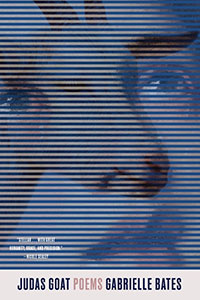 |
Immersed in the indelible world of the Deep South, Judas Goat, Gabrielle Bates’s debut collection of poetry, captivates readers with dynamic lyricism and images that are as violent as they are tender. In an intimate, unflinching voice, Bates ruminates on womanhood, femininity, religion, maternal absence, and the South.
Early in the book, Bates introduces the speaker’s inability to escape their childhood home of Alabama. “Should the First Calf of Winter Be White, You’re Going to Hate” places us in a childhood bedroom on a farm. “I’ll always be there. My bed was by the door,” the speaker tells us. This moment launches a preoccupation that permeates the collection: place and the role it inhabits in the formation of someone, and how that place follows one into adulthood.
“What the self forms around / cannot be undone. In Alabama . . . ” Bates writes in “Effigy.” This speaker was formed in Alabama, and the locale that built them can never be entirely left behind. This relentless presence of place simmers beneath the entirety of the collection, much like it simmers beneath the speaker’s existence in the present tense.
Though bound to a specific place, these poems paradoxically also often seem to exist in a place outside of time. This timelessness is reflected not only in the speaker’s inability to leave Alabama and their own past, but in the connection they feel to a wider, female history. In the speaker, Bates forges connections with women throughout human
history—“The Animals We Are” tells of gathering pecans in a T-shirt, invoking the image of women throughout history gathering things in their aprons. The apron has, in a moment, become an eight-year-old’s shirt. Bates writes, “—how women do this.” This abstract connection becomes concrete, too, in specific figures: the biblical Mary, Sharon Olds, Lucille Clifton, Brigit Pegeen Kelly.
This connection to womanhood, however pervasive, is an emblem of a search for connection to the specifically maternal, to an absent mother. The speaker searches for a mother figure everywhere—in herself, in her father, in Mary, in Kelly. As the collection navigates to a close, the searching, too, closes in on itself. In “Garden,” Bates writes, “Feeling my mother’s head / on my shoulder, I am mourning / my childhood without her.” In “Salmon:” “I am my father’s only child, and he is my mother.” The penultimate poem of the collection, “Mothers” imagines a sort of maternal figure in Kelly while the speaker contemplates her relationship with her own mother. Of the mother, Bates writes, “In a language neither of us knows, / she is telling me she loves me . . . ”
The end of the collection leaves the reader not with satisfaction or finality, but with a sharp longing. An ache for something that can never truly be recovered, but that is still felt nonetheless.
Gabrielle Bates is the author of Judas Goat (Tin House, 2023). Her work has appeared in American Poetry Review, The New Yorker, Poetry, Ploughshares, and the Best of the Net anthology, among other journals and anthologies. She works for Open Books: A Poem Emporium and is cohost of The Poet Salon podcast.
~
Some Problems with Autobiography by Brian Brodeur | Review by Waverley Vesely
Criterion Books, 2023
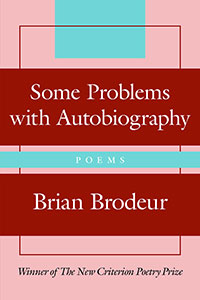 |
Brian Brodeur’s fourth collection of poetry, Some Problems with Autobiography, investigates questions of language, time, and self through poems that deftly suspend our usual expectations of past, present, and future. In the process, he employs considerable temporal dexterity to open a space for his poems to explore not only how history is embodied in contemporary social structures but also how current events and technological advancements are shaping what is to come. In “On the Prospect of a Nuclear Exchange,” Brodeur writes “A hybrid’s bumper sticker reads, / THE FUTURE’S NOTHING LIKE IT USED TO BE.”
At the core of the collection is a prescient understanding of the social and psychological forces that shape experience—the poems themselves exist as subtle resonances, nexuses where identities move into and through one another as objects mutually mediated by language and the rhetoric it implicitly bears. Brodeur writes with wisdom, kindness, and an eye attuned to the profound questions of humanity.
“Barcode Ode,” a poem that appears early in the collection, establishes an ironic claim that underlines a tension between utility and beauty in language: “Forgive what words offend. // All message and no art, a means of meaning.” While Brodeur’s poetry unifies art and meaning, an undertone of this claim haunts the rest of the book. The poem questions the role of language in the making of self, the introjection of meaning made by other-than-the-self, and the impact of modulating language that permeates words.
In “On Mistaking a Stranger for a Dead Friend,” Brodeur writes “Shouldn’t egret share a root / with regret? Seem with seam?” The hypothetical etymological link addresses not only the lineage of language but also emphasizes the associative logic of text and sight in cognition, which is, in some capacity, a core of poetic movement. A dead friend is seen in another. One word catalyzes the presence of another in thought. An egret becomes more than a bird. This technique of isolating a concrete image and using it to generate associative momentum is not only at the core of the poems in Brodeur’s collection but is also central to the book’s commentary on what comprises selfhood—as something perhaps more dynamic and unstable than can be held in linear logic. This sentiment is expressed directly in “Parents of Middle-Aged Children:” “The script is fixed. They won’t explain themselves. / Like teens home late with hair shedding dried leaves, / they doubt the self could ever be explained.” However aware of this fungibility Brodeur’s poems are, they are also intimate, heartfelt rebellions against stable definitions and scripts of self.
The complexity of identity is further investigated through the destabilization of shape. “Starlings, startled from their roost, retain / the bell-shape of the trees in flits and whorls, / then scatter on a field ice-paned from rain. / The dream dissolves. There is no ‘thing itself,’” writes Brodeur in “Woman Waking in Late Fall.” The starlings, each individual shapes in their own right, inhabit two larger shapes—that of the murmuration, and that of the tree that sculpted the geometry of their flight. Situating not only physical form but also the residue of form, lends heft and solidity to the idea that vestiges of history haunt what follows.
As the title poem suggests, the speaker and reader both engage in an act of dialog with the past: “faces glimpsed again through gaps in mist / as you revive quarrels with the dead.” In a way, the poems in Some Problems with Autobiography suggest we are palimpsests, each ghosted by too many layers to delineate precisely what defines
selfhood—an opacity intensified more by the final line of the collection from the poem, “Primer.” “[S]oon,” the poet tells us, “this will all have happened long ago.” Brodeur’s foresight and awareness of the duality of impermanence and permanence resonate profoundly through his poems. The weight of their meaning, their art, lingers with a depth met by few other poets, and it is perhaps through their incisiveness that Brodeur’s poems manage to avoid the ephemerality of which they are aware.
Brian Brodeur is the author of four poetry collections, most recently Some Problems with Autobiography (Criterion Books, 2023), winner of the 2022 New Criterion Poetry Prize. His poetry and literary criticism have appeared in Blackbird, Image, Literary Matters, the Los Angeles Review of Books, and The New Criterion, among others. He teaches at Indiana University East.
~
Blessing the Exoskeleton by Andrew Hemmert | Review by Caroline Richards
University of Pittsburgh Press, 2022
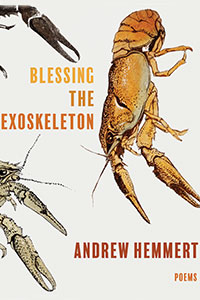 |
The opening poem of Andrew Hemmert’s second collection, Blessing the Exoskeleton, demands attention as a portrait of the liminal rooms we enter during the formation of identity, of the tentative space occupied by human life and the inevitable uncertainty of its future. Following the trail laid out by “Of Corridors,” Hemmert’s imagery throughout this collection is grounded in the context of a fraying postindustrial American landscape, a place that insists on a culture of “catching up” just as it seems to reiterate its impermanence.
For Hemmert, reckonings of extinction are quotidian, as are feelings of disenchantment. The onslaught of the news, the persistence of climate change’s effects, and the polarization of American politics all become sites of exploration into how to go on. “Of Corridors” in particular establishes a tone that is, at points, hopeful, and at others deeply melancholic and cynical.
This emotional temperature infuses the entire collection—in “Cocktail Theory,” Hemmert describes using a parking ticket as a bookmark, “so my place / is finally defined / by mistake and what I owe.” In “Phoenix Theory,” he writes “Mostly I do not feel small / and when I do I am / watching the news.”
Yet, in poems like “In Remembrance,” Hemmert recalls a wind-up teddy bear from his childhood and writes, “If you want proof // of love’s ragged effects / on the body, I can show you / how little of that bear’s fake fur // remains after all my hugging.” In “The Smoking Gun,” he writes, “The world // is a small animal / building a nest in my boot.”
Hemmert undulates between this darker, haunted undertone of fatigue and self-doubt and an essential grasping toward hopefulness, toward a semblance of relief. In this way, his position remains deeply nuanced—he is quick to identify beauty in this cultural ugliness, but the ugliness nonetheless remains. His poems are thus fascinated by this space in-between: the existential of the everyday and the subsequent way it forces us to take stock of the good things, however small they might be.
His sequence of “theory” poems reflects this attitude and posits a method of coping—a grain of hopeful truth within a larger, grimmer reality. In “Cathedral Theory,” he writes, “When I heard the bees / living in the roof of Notre Dame / survived the fire, I decided / I could make it to summer,” and in “Future Theory,” he adds, “ . . . because you’re alive / and living is a procession of let downs punctuated / hopefully by pinnacles of good feeling.” Even when depicting a burning house in “Light Theory,” he describes finding a spider “reeling its way down . . . like a child’s diorama of the solar system.”
Hemmert presents us with a collection that feels deeply truthful in the way it presents our ironic optimism in the face of impending societal collapse. The way we approach the daily task of existing is, he suggests, like “opening a door in the air.”
Andrew Hemmert is the author of Blessing the Exoskeleton (University of Pittsburgh Press, 2022) and Sawgrass Sky (Texas Review Press, 2021). His poems have appeared or are forthcoming in The Cincinnati Review, Kenyon Review, Michigan Quarterly Review, Prairie Schooner, and The Southern Review.
~
Beyond Belief by John Koethe | Review by Danielle Kotrla
Farrar, Straus and Giroux, 2022
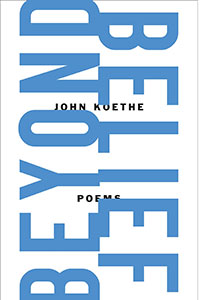 |
In Beyond Belief, his eleventh collection of poems, John Koethe thoughtfully considers the rhythm of our lives, the stories about them that memory compels us to tell, and the complicated set of emotions and observations that arise in the face of an extended contemplation on aging and the passing of one’s own life. In “The Wonder of Having Lived Here a Long Time,” Koethe writes, “I’ve no idea what other people feel / As they get old, but I feel nothing but amazement, not at what I am, / Which is commonplace and ordinary, but that I am and have a life at all.” He goes on to draw a connection between the appearances of our private lives and the Self, ultimately concluding that they are importantly, and fundamentally, the same thing.
The poems in the collection take place in several locations, both in setting and memory, from San Diego to New York to Milwaukee, reminding us as readers that home, and everything nebulously associated with it, changes—and continues to change—over the course of our lives. This is one of the ways in which this collection feels expansive, and extended spatially.
Koethe also investigates the question of complicated temporal boundaries and in “Worlds Enough and Time” does so by drawing a distinction between three worlds. The first two are the private world and the world “out there” that is indifferent and experienced by all. Most interesting perhaps is the one that Koethe describes as “the problematic one behind them both / That spreads through time in ways that make it hard / To understand how the other two could possibly be real.”
It is to this problematic world that Koethe returns with regularity throughout his collection. When the speaker in “Lives” describes it as “metaphysically thin,” and points to the difficulty of even trying to discuss this world, he notes the frustration that in trying to describe it, “all I find are words / For where I am: this room, this place I live.” And though there is a sense of frustration that comes from wanting to explain (a frustration that is not wholly unexpected, given Koethe’s work as a philosopher), this frustration morphs in numerous interesting directions throughout the book.
For example, Koethe chooses to end poems appearing later in the book with a sort of understanding that despite not being able to grasp this problematic world—or the other two sometimes, for that matter—there exists something important and pleasant about the agency we exercise in thinking about it. For instance, the book’s title poem ends with the speaker desiring to be taught how to sit still, and “Life in Rhyme” closes with a meditation on what existence might depend on and what it means to inhabit this geographical space. After this meditation, the speaker’s resulting desire is simply to go out on the porch.
This collection takes up many difficult questions and asks us to sit with them for an extended period of time as we are led through a dialogue that, in other hands, might ultimately be off-putting, difficult to stomach, or exhausting. But Koethe’s deft movement between the everyday details of our lives and the abstractions of these larger meditations gives the poems a certain energy that is revitalizing and pleasant in its engagement. The voice and syntax of these poems are colloquial in many ways, with Koethe inviting the reader in by dropping us into the midst of what seem like casual conversations between two friends who haven’t been able to catch up in some time.
For example, “Epithalamion” opens with the line, “I don’t know how we did it, but we did,” and Koethe makes similar starting moves throughout the collection—opening with a line that includes an unclear reference to an event or subject matter. Readers find clarity by reading on or by recalling the title, but in any case, the experience feels similar to how we talk with those we’re close to—the conversations bleed into one another and make leaps that only two people who know each other well could follow. A sense of intimacy arises from this method, and Koethe’s voice in these poems does the job of balancing the scales. Reflections on the particular details from the past do not slip into nostalgia, and the meditations on larger questions do not devolve into the recounting of philosophical arguments.
Despite being an emeritus professor of philosophy, Koethe writes in “Worlds Enough and Time,” “I’ve always / Hated poems about philosophy, and I hope I still do,” and this collection asks us to remember that considering the passing of time and, by extension, the passing of our lives isn’t at its core a philosophical inclination, but a human one.
The final poem in the book, “A Way of Putting It,” leaves us with the notion that “ . . . getting older is a study in tone / That leaves you where you are—still listening to yourself / A lifetime away from where you started, and not far from home.” This final line achieves one of the book’s primary aims: to capture a facet of that complicated, problematic world in which we find ourselves so very far away from what we know of our past Self, and still always headed home.
John Koethe is the author of nearly a dozen books of poetry, most recently Beyond Belief (Farrar, Straus and Giroux, 2022). He has received the Lenore Marshall Poetry Prize, the Kingsley Tufts Poetry Award, and the Frank O’Hara Award for Poetry. He is distinguished professor emeritus of philosophy at the University of Wisconsin–Milwaukee.
~
summonings by Raena Shirali | Review by Dina Folgia
Black Lawrence Press, 2022
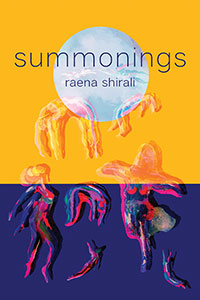 |
In summonings, her second collection of poetry, Raena Shirali employs lyric and language to explore the weaponization of patriarchy and the reckoning of a culture—conjuring history through her words and their arrangement and begging her readers to stare oppression in the face.
Shirali particularly brings to light the antiquated, hazardous, and deeply misogynistic practice of witch hunting in Jharkhand and West Bengal, a practice that has threatened the safety of women in this region for hundreds of years. She bears witness to the two cultures that she straddles: the culture of India, which worships femininity in religion but mistreats real women who challenge tradition, and the culture of America, which seems progressive on the surface but is still rooted in dangerous and detrimental behaviors.
Shirali gives us stories of the many women who have been wronged by the habits of these cultures, and by extension she observes her own role as a woman attempting to survive in a world that continues to demonstrate how little it values the safe existence of its women.
In “summoning : ways you asked for it,” Shirali writes: “were you in a village / or deep in a borough / either way was the street / dark never mind you know / the streets darken when women walk alone / & knowing this you do what you’ve been told / you should be absolutely fine doing.” Here, as in many of the poems in this collection, she weaves together the experience of the American woman with the Indian woman, transforming this poem into a universal narrative that can resonate with all women, no matter their geography.
Throughout her “summoning” poems, she ponders this midpoint between cultures—examining where the various key lines of her existence (and the existences of the women who came before her) intersect. Earlier in “summoning : retreat,” she writes: “even in such / a privileged space / i’ve seen / what men can do.” In the poems of summonings, we all see what men can do, and we see how widely and deeply that influence has permeated both cultures.
From the foreword to the final poem, Shirali makes clear that she has researched this topic with care, and throughout the collection she has embedded the voices of scholars and experts on the subject of the daayan (a witch or succubus in Indian folklore). The research involved in this project has been a driving force of its delivery, as each line is richly laden with carefully curated information—exemplified in narratives that draw from the lived experiences of both Shirali and the daayan she speaks for.
Her work, however, underscores the question: even with the accumulation of all of this knowledge, all of this available research on the subjects of these witch hunts, why are these dangerous practices still allowed to exist in India today?
Shirali specifically raises the issue in the book’s foreword where Shirali quotes Ayesha Matthan, a scholar of Indian art and culture: “How do we make sense of the overall dismal condition of Indian women—measured in terms of the sex-ratio, life expectancy, literacy, income, subjection to violence, equality of opportunity, legal equality, and societal attitudes towards her—in a society that worships the all-powerful goddess in her many forms?”
Despite the heaviness of the subject matter explored in summonings, Shirali writes from a place of hope for future generations of women and uses her work as both an examination of current reality and a cry for change. She acknowledges where women have been, where women are, and where women could be if they were recognized and respected with grace rather than faced with persecution. She imagines a world where she can be completely herself—a daughter of immigrants, an Indian woman, an American woman, a liberated writer—without fear of some silence on the horizon. She imagines this world in the final lines of summonings, found in “at home, in the empire,” ending her collection with a resounding call: “women, i want it to be / believable : that we leave the bar, the sky stupid // with gold. that no one follows us home.” ![]()
Raena Shirali is the author of summonings (Black Lawrence Press, 2022) and GILT (YesYes Books, 2017). Her work has appeared in Adroit, Blackbird, The Nation, Tupelo Quarterly, Virginia Quarterly Review, and others. She is an assistant professor of English at Holy Family University.